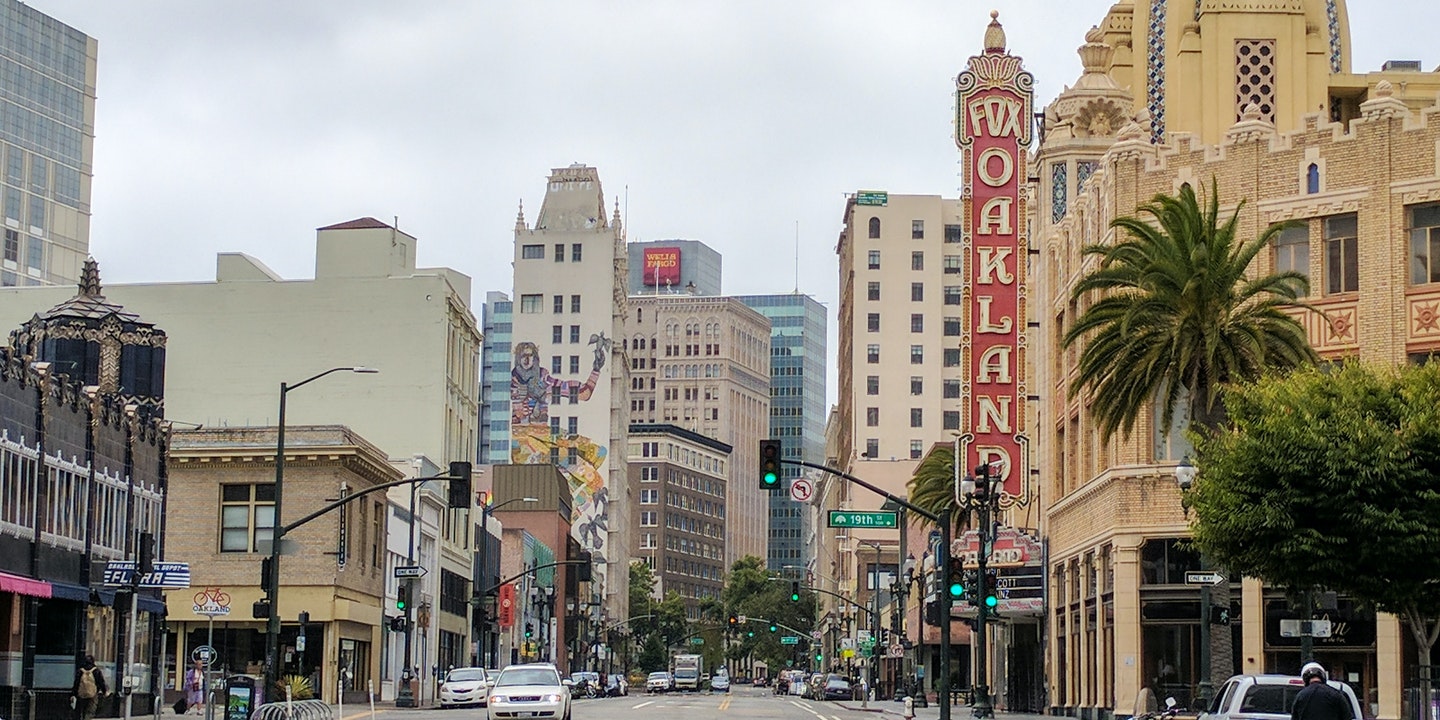Business
Multicultural Business Leaders Call for Immediate Change in City’s Contracting Practices
The group is asking that the city “address delineate grave concerns centered on disparities that plague contracting opportunities for Black, minority and women-owned businesses. Further, request for Reiskin and his administrative team to institute and implement needed changes with immediacy, by year’s end.”


Ed Reiskin Oakland City Administrator

Cathy D. Adams
The Oakland African American Chamber of Commerce (OAACC), led by President and CEO Cathy D. Adams, recently held a virtual meeting with Ed Reiskin, City Administrator, Oakland’s top executive.
Following a series of ongoing meetings throughout 2021, the collective is calling for measurable actions to resolve systemic problems in City of Oakland contracting practices.
The group is asking that the city “address delineate grave concerns centered on disparities that plague contracting opportunities for Black, minority and women-owned businesses. Further, request for Reiskin and his administrative team to institute and implement needed changes with immediacy, by year’s end.”
“We want everyone to be clear and concise,” said Adams. “We know where we’ve been, and we know how we feel. However, for the sake of our businesses, we are focused on remedies to bring equity and parity to all city contracts. We want progress and fairness in 2021 – the time is now.”
The collective maintains that all multicultural businesses are experiencing the same fate.
OAACC is working with other local chamber leaders including Jessica Chen (executive director, Oakland Chinatown Chamber of Commerce), Barbara Leslie (president and CEO, Oakland Metropolitan Chamber of Commerce), Jennifer Tran (executive director, Oakland Vietnamese Chamber of Commerce); along with business executives Rick da Silva (LOH Realty & Investments/Wellington Property Company), Joe Partida (Partida Benefits & Insurance), Michael Baines (BGI Construction, INC) and; Paul Cobb, publisher, Post News Group.
“There are three issues impacting the contracting activity in the City of Oakland,” said Eddie Dillard, former president and CEO of the Oakland Black Board of Trade and Commerce, a meeting participant. “First, the City of Oakland does not collect fines and penalties on non-compliant prime contractors.”
Citing an example, Dillard said, “A prime contractor who built the McArthur BART Transit Village Project was found to be non-compliant with the law and was assessed a $4 million fine. One year since the citation, the City of Oakland has not collected the fine. Monies from this fine could pay the combined budgets of city departments, specifically, Workplace and Employment and Race and Equity departments.”
Dillard continued, “Black contractors are included in city bids for public contracts, yet when the awards are given to prime contractors, Blacks contractors are removed from participation. This pattern and practice is illegal and against State law. We have witnessed this blatant exclusion from contracting awards, time and again among qualified Oakland-based Black businesses.”
“The repeated practice by city departments that issue waivers to non-compliant Small Local Business Enterprise (SLBE) and Local Business Enterprise (LBE) programs must stop,” Dillard said. “The continued practice of these non-compliant waivers, sponsored by department heads, relieves the city from enforcing its legally bound commitment to promote and utilize Oakland-based certificated firms. This pattern and practice must cease if we are to close the inequality gap addressed in the most recent disparity study.”
Participating business leaders and community activists focused on the following:
- Minority businesses directly impact the city’s economy, tax base, infrastructure, workforce, community stability and public safety;
- Equity, parity, and inclusion is not a trendy tagline rather requirements for all businesses;
- Equitable distribution of all contracts for all businesses;
- Strengthen city staffing to process corrections to policy deficiencies in a timely manner;
- Immediate redress to cure systemic challenges and problems with all city contracts;
- Implement and maintain accountability metrics with all city contracts;
- Adhere to findings in the disparity study;
- Actionable framework and timeline to enforce curative resolution to the City’s contracting practices with all businesses.
The Oakland Post’s coverage of local news in Alameda County is supported by the Ethnic Media Sustainability Initiative, a program created by California Black Media and Ethnic Media Services to support community newspapers across California.
Bay Area
State Controller Malia Cohen Keynote Speaker at S.F. Wealth Conference
California State Controller Malia Cohen delivered the keynote speech to over 50 business women at the Black Wealth Brunch held on March 28 at the War Memorial and Performing Arts Center at 301 Van Ness Ave. in San Francisco. The Enterprising Women Networking SF Chapter of the American Business Women’s Association (ABWA) hosted the Green Room event to launch its platform designed to close the racial wealth gap in Black and Brown communities.

By Carla Thomas
California State Controller Malia Cohen delivered the keynote speech to over 50 business women at the Black Wealth Brunch held on March 28 at the War Memorial and Performing Arts Center at 301 Van Ness Ave. in San Francisco.
The Enterprising Women Networking SF Chapter of the American Business Women’s Association (ABWA) hosted the Green Room event to launch its platform designed to close the racial wealth gap in Black and Brown communities.
“Our goal is to educate Black and Brown families in the masses about financial wellness, wealth building, and how to protect and preserve wealth,” said ABWA San Francisco Chapter President LaRonda Smith.
ABWA’s mission is to bring together businesswomen of diverse occupations and provide opportunities for them to help themselves and others grow personally and professionally through leadership, education, networking support, and national recognition.
“This day is about recognizing influential women, hearing from an accomplished woman as our keynote speaker and allowing women to come together as powerful people,” said ABWA SF Chapter Vice President Velma Landers.
More than 60 attendees dined on the culinary delights of Chef Sharon Lee of The Spot catering, which included a full soul food brunch of skewered shrimp, chicken, blackened salmon, and mac and cheese.
Cohen discussed the many economic disparities women and people of color face. From pay equity to financial literacy, Cohen shared not only statistics, but was excited about a new solution in motion which entailed partnering with Californians for Financial Education.
“I want everyone to reach their full potential,” she said. “Just a few weeks ago in Sacramento, I partnered with an organization, Californians for Financial Education.
“We gathered 990 signatures and submitted it to the [California] Secretary of State to get an initiative on the ballot that guarantees personal finance courses for every public school kid in the state of California.
“Every California student deserves an equal opportunity to learn about filing taxes, interest rates, budgets, and understanding the impact of credit scores. The way we begin to do that is to teach it,” Cohen said.
By equipping students with information, Cohen hopes to close the financial wealth gap, and give everyone an opportunity to reach their full financial potential. “They have to first be equipped with the information and education is the key. Then all we need are opportunities to step into spaces and places of power.”
Cohen went on to share that in her own upbringing, she was not guided on financial principles that could jump start her finances. “Communities of color don’t have the same information and I don’t know about you, but I did not grow up listening to my parents discussing their assets, their investments, and diversifying their portfolio. This is the kind of nomenclature and language we are trying to introduce to our future generations so we can pivot from a life of poverty so we can pivot away and never return to poverty.”
Cohen urged audience members to pass the initiative on the November 2024 ballot.
“When we come together as women, uplift women, and support women, we all win. By networking and learning together, we can continue to build generational wealth,” said Landers. “Passing a powerful initiative will ensure the next generation of California students will be empowered to make more informed financial decisions, decisions that will last them a lifetime.”
Business
Black Business Summit Focuses on Equity, Access and Data
The California African American Chamber of Commerce hosted its second annual “State of the California African American Economy Summit,” with the aim of bolstering Black economic influence through education and fellowship. Held Jan. 24 to Jan. 25 at the Westin Los Angeles Airport Hotel, the convention brought together some of the most influential Black business leaders, policy makers and economic thinkers in the state. The discussions focused on a wide range of economic topics pertinent to California’s African American business community, including policy, government contracts, and equity, and more.

By Solomon O. Smith, California Black Media
The California African American Chamber of Commerce hosted its second annual “State of the California African American Economy Summit,” with the aim of bolstering Black economic influence through education and fellowship.
Held Jan. 24 to Jan. 25 at the Westin Los Angeles Airport Hotel, the convention brought together some of the most influential Black business leaders, policy makers and economic thinkers in the state. The discussions focused on a wide range of economic topics pertinent to California’s African American business community, including policy, government contracts, and equity, and more.
Toks Omishakin, Secretary of the California State Transportation Agency (CALSTA) was a guest at the event. He told attendees about his department’s efforts to increase access for Black business owners.
“One thing I’m taking away from this for sure is we’re going to have to do a better job of connecting through your chambers of all these opportunities of billions of dollars that are coming down the pike. I’m honestly disappointed that people don’t know, so we’ll do better,” said Omishakin.
Lueathel Seawood, the president of the African American Chamber of Commerce of San Joaquin County, expressed frustration with obtaining federal contracts for small businesses, and completing the process. She observed that once a small business was certified as DBE, a Disadvantaged Business Enterprises, there was little help getting to the next step.
Omishakin admitted there is more work to be done to help them complete the process and include them in upcoming projects. However, the high-speed rail system expansion by the California High-Speed Rail Authority has set a goal of 30% participation from small businesses — only 10 percent is set aside for DBE.
The importance of Diversity, Equity and Inclusion (DEI) in economics was reinforced during the “State of the California Economy” talk led by author and economist Julianne Malveaux, and Anthony Asadullah Samad, Executive Director of the Mervyn Dymally African American Political and Economic Institute (MDAAPEI) at California State University, Dominguez Hills.
Assaults on DEI disproportionately affect women of color and Black women, according to Malveaux. When asked what role the loss of DEI might serve in economics, she suggested a more sinister purpose.
“The genesis of all this is anti-blackness. So, your question about how this fits into the economy is economic exclusion, that essentially has been promoted as public policy,” said Malveaux.
The most anticipated speaker at the event was Janice Bryant Howroyd known affectionately to her peers as “JBH.” She is one of the first Black women to run and own a multi-billion-dollar company. Her company ActOne Group, is one of the largest, and most recognized, hiring, staffing and human resources firms in the world. She is the author of “Acting Up” and has a profile on Forbes.
Chairman of the board of directors of the California African American Chamber of Commerce, Timothy Alan Simon, a lawyer and the first Black Appointments Secretary in the Office of the Governor of California, moderated. They discussed the state of Black entrepreneurship in the country and Howroyd gave advice to other business owners.
“We look to inspire and educate,” said Howroyd. “Inspiration is great but when I’ve got people’s attention, I want to teach them something.”
Activism
Oakland Post: Week of April 17 – 23, 2024
The printed Weekly Edition of the Oakland Post: Week of April 17 – 23, 2024

To enlarge your view of this issue, use the slider, magnifying glass icon or full page icon in the lower right corner of the browser window. ![]()
-

 Activism4 weeks ago
Activism4 weeks agoOakland Post: Week of March 27 – April 2, 2024
-

 #NNPA BlackPress4 weeks ago
#NNPA BlackPress4 weeks agoCOMMENTARY: D.C. Crime Bill Fails to Address Root Causes of Violence and Incarceration
-

 #NNPA BlackPress4 weeks ago
#NNPA BlackPress4 weeks agoMayor, City Council President React to May 31 Closing of Birmingham-Southern College
-

 #NNPA BlackPress4 weeks ago
#NNPA BlackPress4 weeks agoBeloved Actor and Activist Louis Cameron Gossett Jr. Dies at 87
-

 Community1 week ago
Community1 week agoFinancial Assistance Bill for Descendants of Enslaved Persons to Help Them Purchase, Own, or Maintain a Home
-

 Activism3 weeks ago
Activism3 weeks agoOakland Post: Week of April 3 – 6, 2024
-

 Business1 week ago
Business1 week agoV.P. Kamala Harris: Americans With Criminal Records Will Soon Be Eligible for SBA Loans
-

 Activism2 weeks ago
Activism2 weeks agoOakland Post: Week of April 10 – 16, 2024



















































